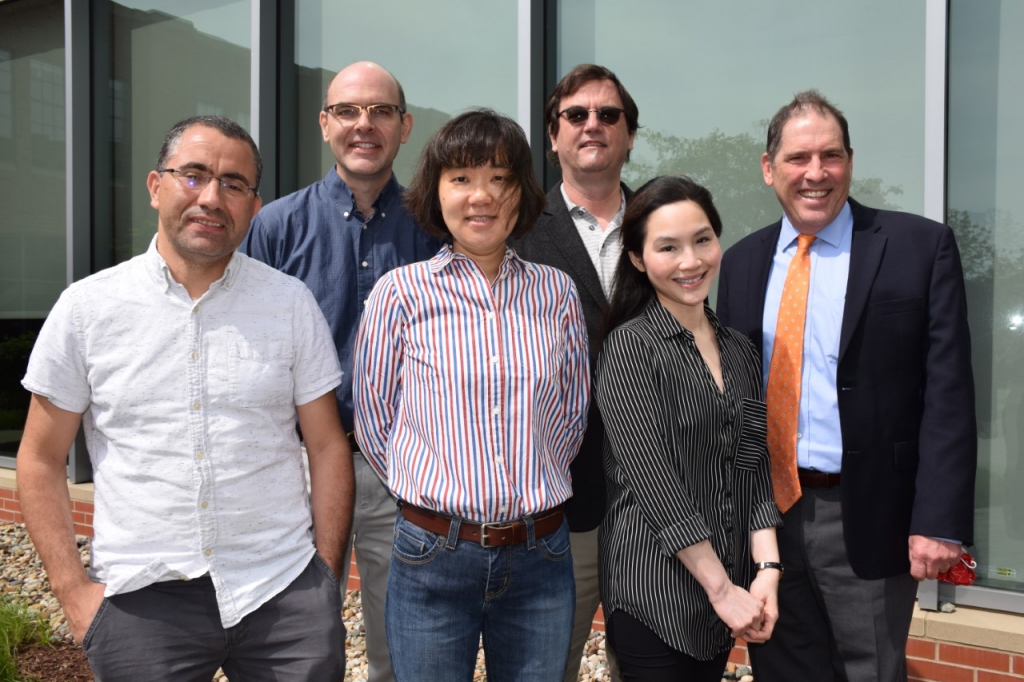Ashley Washburn, May 24, 2021
NU receives $20 million grant to advance quantum research, education
The University of Nebraska has received a five-year, $20 million award from the National Science Foundation’s Established Program to Stimulate Competitive Research (EPSCoR) to create a research and education cluster aimed at enhancing the state’s competitiveness in the field of emergent quantum materials and technologies, and boosting the participating institutions’ research and education capacity.
The field of materials science and technology is undergoing a second quantum revolution, which is expected to revolutionize information technology, medical technology and cryptography, which impacts security measures used in defense and banking. The new Emergent Quantum Materials and Technologies collaboration – known as EQUATE – is Nebraska’s answer to leading this movement and preparing the next generation of scientists and engineers, said Matt Andrews, Nebraska EPSCoR director and the project’s principal investigator. It is supported with an NSF Research Infrastructure Improvement-Track 1 award.
Andrews said the university’s expertise in materials and nanoscience, experience leading major NSF-funded projects and track record of collaborating across campuses and disciplines have positioned the project to succeed. Quantum science and related technologies are a top scientific priority at the federal level, and EQUATE is one result of the National Quantum Initiative passed by Congress in 2018 to position the U.S. as a leading global competitor in the field.
José Colom-Ustáriz, an NSF EPSCoR program director said, “This project furthers Nebraska’s strategic priority to advance knowledge in quantum phenomena. It has the potential to benefit society through research outcomes, workforce development and STEM education and training, specifically in Native American and rural communities.”
EQUATE includes 20 faculty members from the University of Nebraska-Lincoln, University of Nebraska at Omaha, University of Nebraska at Kearney and Creighton University. It also will leverage existing partnerships with Little Priest Tribal College and Nebraska Indian Community College. UNL physicist Christian Binek, Charles Bessey Professor of physics and director of the Nebraska Center for Materials and Nanoscience, will serve as EQUATE’s scientific director.
The collaboration’s goal is to stimulate scientific discovery in how quantum materials and systems are designed and implemented, which has the potential to revolutionize technologies used in communication and information processing.
The team also aims to grow the state’s economic competitiveness through a well-trained workforce; establish education and outreach programs to increase understanding of quantum science and technology, particularly among elementary and secondary students, underrepresented groups and rural populations; invest in new, cutting-edge equipment; make strategic faculty hires to increase research capacity and expertise; engage with local industry partners; and secure major research funding.
“Thanks to our faculty, the University of Nebraska has built a proven record of success in quantum science. This new award, made possible by the collaborative power of our campuses and partners, will only grow the impact of our work,” said University of Nebraska System President Ted Carter. “EQUATE will significantly expand our state’s research and teaching capacity, make cutting-edge science accessible to more Nebraskans, and create economic growth.”
Binek said the award process was highly competitive, with the university’s nationally recognized expertise in nanomaterials science and world-class facilities giving it an edge. Together, the Nebraska Center for Materials and Nanoscience, established in 1988, and UNL’s Materials Research Science and Engineering Center, funded by NSF for 18 years, created a foundation for success and eventually led to formation of the Nebraska Nanoscale Facility, all fundamental to EQUATE’s work.
“UNL has led internationally for decades in physics and quantum science, with quantum science and engineering currently a key focus as one of UNL’s seven Grand Challenges. This significant award allows our scientists and educators to continue to be on the forefront of the new quantum revolution,” said UNL Chancellor Ronnie Green. “The potential in EQUATE will translate into enormous positive impacts across Nebraska’s flagship, land-grant research university, with our partners across the NU system, and on behalf of Nebraskans.”
In addition to Andrews and Binek, the EQUATE leadership team includes Rebecca Lai, associate professor of chemistry; Xia Hong, associate professor of physics and astronomy; Abdelghani Laraoui, assistant professor of mechanical and materials engineering; and Jonathan Wrubel, associate professor of physics at Creighton University. Faculty affiliates include researchers from UNL’s departments of physics and astronomy, electrical and computer engineering, chemistry and mechanical and materials engineering; and the UNK, UNO and Creighton departments of physics.
EPSCoR Nanoscience Nebraska Center for Materials and Nanoscience






